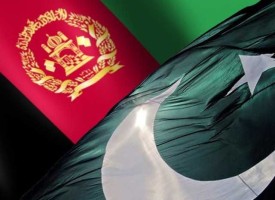According to statistics updated on June 14, 2015 by the South Asia Terrorism Portal (SATA), almost 58,055 Pakistanis (civilians and military personnel) have lost their lives to terrorism since 2003. This means that around 4,838 people were killed per year on an average. These figures reflect the next-to-none assurance of human security in a country that has played the role of a frontline state in the so-called War on Terrorism. Although there is a majority consensus that the war has now become a localized War against Terrorism (by the State of Pakistan against anti-state elements), it seems successive governments have not given due consideration to improving the security of the ordinary citizen.
State security, or protection of the country’s territorial and infrastructural integrity, is the responsibility of the armed forces. They are tasked with ensuring that our borders are safe and no external or internal conspiracy will harm its interests. On the other hand, human security as an essential responsibility of the national government is the primary responsibility of police forces.
Pakistan’s incessant engagement in counter-terrorism initiatives since the Musharraf era has transformed it from a peaceful country to a state that has been at war for too long. Deterioration of internal security has kept security and law-enforcement agencies so alert that they have practically exhausted themselves out; they are fast running out of clear policy directives. The armed forces are doing their job to a satisfactory end and to the best of their abilities amidst severe resource and budget constraints. However, the necessary guidance and finance required from the federal government to tackle the core issues of terrorism and its roots (extremism, radicalization) are nowhere to be found.
Establishment of NACTA to fill the vacuum
The National Counter Terrorism Authority (“NACTA” for short) was established by the Government of Pakistan in 2009. It describes itself as an “internal counter-extremism intelligence agency and the tactical special weapons law-enforcement force which uses military-style light weapons and specialized tactics in high-risk operations that fall outside the capabilities of regular and uniformed police“.
NACTA was mandated to develop a national counter-terrorism strategy to address short, medium and long-term goals for the state to ultimately rid itself of the menace of terrorism and extremism. Although the basic framework of NACTA was set up in 2009, it was formally given authoritative powers, at least in writing, with the passing of the NACTA Act (2013).
To date, no one truly knows what NACTA does except for occasional citations in media reports and TV talk shows. The irony is, NACTA’s official website, which has been down reportedly for “construction” since two or three months, is still inactive. Not many people are aware of its organogram, core competencies, authorized powers, fulfilled objectives and pending goals. Perhaps the only monumental work done by this body was the formulation of an all-comprehensive National Internal Security Policy (NISP) and its relevant Concept Paper.
The most glaring observation noted in NISP is the lack of a Composite Deterrence Plan (CDP). Efforts for a Comprehensive Response Plan (CRP) were automatically realized after the tragic attack on APS Peshawar on December 16, 2014. According to NISP, the country’s National Internal Security Apparatus (civil and military security/law-enforcement agencies) needs restructuring and capacity-building “on urgent basis for enhanced service delivery of justice and security” i.e. taking into account delays in legal prosecutions as well. Also, it is worth noting that NISP rightfully stresses the need to change the national counter-terrorism posture from “reactive” to “proactive“.
Going through the NISP leave readers perplexed: despite the existence of such an all-inclusive, comprehensive security policy, why has nothing practical been achieved? In fact, studying it in detail will make readers question the need for a National Action Plan (NAP) which was promulgated by the military leadership in conjunction with the state executive. The reasons for it are many. Despite subordination to an otherwise active Ministry of Interior, it is dormant. Simply inactive. Some reports suggest NACTA is coordinating intelligence between various agencies behind the scenes but these are mere claims without substantial evidence. If intelligence coordination was indeed taking place, the Government of Pakistan would not have formulated NAP and provincial apex committees to follow up on implementation of it would not have been established.
NACTA: Victim of government neglect
As with most bureaucratic institutions, NACTA too is suffering from lack of seriousness by the “babus” sitting in the Ministry of Interior and in the Prime Minister’s immediate circle of advisors. Even the seemingly-committed Interior Minister is tight-lipped on NACTA’s current operational status.
To be fair to NACTA, it has been victimized not only by bureaucratic non-seriousness but also interference from other institutions. For example, it was reported sometime in September 2013 that around 500 candidates applying to NACTA for recruitment were caught cheating, 50 of them (allegedly) serving officers in the IB and ISI. There has long been a tradition of recruiting police constables and sub-inspectors for nominal fees, with favors mostly going to those “aspirants” who are supporters of the ruling regime. This mass politicization of the police is one of the fundamental reasons for Pakistan being in the state of quagmire it is in today. If only the police was free from any political interference, the country’s internal security situation would have greatly improved within months.
There are several experienced staffers at NACTA, Akbar Nasir Khan being most prominent among them. A distinguished PSP officer with extensive counter-terrorism experience, Khan is presently the Chief of Staff at NACTA who oversees administrative and HR issues in the agency. His profile, impressive by all means itself, showcases his subject-matter expertise on issues affecting the rule of law and security. As a Harvard graduate, Khan has offered services for international peacekeeping organizations across Africa, Europe and Asia. In Pakistan, he is considered as the main formulator of the NISP. Despite the availability of such talented and learned officers, why is NACTA not given any serious attention?
Funds matter
Institutions require qualified manpower. This manpower, in the specific requirements of NACTA, generally includes operators, analysts and coordinators. Operators perform field duties and collect intelligence from all the civil-military intelligence agencies to present a “fused” (compact) net assessment of leads. Analysts study these leads and generate finished intelligence products. Coordinators distribute/forward these intelligence products to relevant law-enforcement agencies for timely action.
Such a skilled manpower is obviously not that easy to find in Pakistan. Simply allocating the services of a few police officer cadres will not do. Civilian subject-experts will also need to be taken onboard. Analysis is what will determine NACTA’s efficiency and conventional police officers are far too inexperienced to interpret intelligence data from a variety of sources.
The human resource factor can be overcome within weeks but then again, a sufficient amount of funds is required not only to employ these specialists, but also to provide NACTA with resources it needs to activate the Research & Coordination Directorate which heads the following subordinate units (as mentioned in the NISP Concept Paper):
• National Narrative
• De-Radicalization
• Mosque and Madrassa
• Legal Reform
• Reconstruction
• Rehabilitation
• Reconciliation
• Reintegration
The first four units i.e. National Narrative, De-Radicalization, Mosque and Madrassa and Legal Reform are so essential in solving Pakistan’s current internal security woes that NACTA’s role in this could considerably help the military forces focus on more important issues of Counter Insurgency (COIN) and prevention of external threats. Furthermore, the army would not have been dragged into a controversy against the judiciary if NACTA’s Legal Reform wing was operational. The unavailability of such a body compelled the Pakistan Army to restructure its Judge Advocate General (JAG) Branch and establish a nascent “Lawfare Directorate”.
Unfortunately, NACTA has not been allocated any funds in the recent federal budget. The Finance Minister was quick to assert it is part of the funds given to the Ministry of Interior but reportedly, a senior official in the ministry quickly rejected this claim and lamented that NACTA has not received any funds, neither has it been made “vibrant” since its inception in 2009. This is a resounding claim which makes it absolutely clear the state executive (ruling regime) wants the armed forces to bear the complete and overall responsibility of maintaining internal security. Political will and ownership through civilian institutions is missing.
Is the Pakistan Army going to be transformed into a police force in streets and alleys? Will the Pakistan Army follow financial trails of madrassas, mosques and imam-bargahs which receive billions in aid each year from foreign countries? Will the Pakistan Army set up de-radicalization camps across the country? The army is already doing much in this regard through “Mashal” de-radicalization centres in war-affected zones where military operations once took place, as part of reconstruction and restructuring efforts. What role does the Ministry of Interior have, then, with regards to ensuring domestic security as the army focuses on fighting anti-state elements?
NACTA’s legal and operational mandate needs no further modifications. It is perfect in itself as of yet. The handful of experienced experts there who are probably forced to mark attendance in offices or have cups of tea (since nothing is actually available for them to do because of political neglect) should be called by the Prime Minister and Interior Minister of Pakistan, along with supporting presence of Pakistan’s civil-military security institutions. NACTA should be given the necessary funds to fulfill the envisioned ideals of NISP and regulate the national security discourse as a responsible tool of the state executive.
Conclusion
Enforcing the writ of the state is not only the military’s job. NACTA’s disgruntled leadership is more than willing to begin all-round work on implementing NISP, a much more comprehensive precursor to NAP which takes into account the entire spectrum of internal security threats.
Ironically, strengthening of NACTA is mentioned in point 4 of the 20-point NAP. More precisely, it reads “Strengthening and activation of NACTA”. The military’s firm resolve is visible to all by words and actions.
Will the federal government please stop neglecting this issue any longer and insulting the sacrifices rendered by thousands of Pakistanis in the war against terrorism? When will this recklessness and non-seriousness end?








No comments!
There are no comments yet, but you can be first to comment this article.